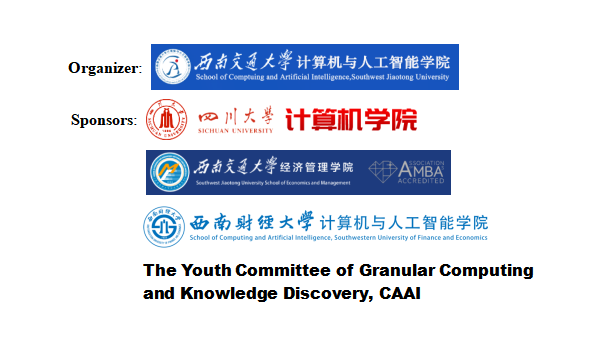International Frontier Forum on Big Data Analysis and Intelligent Computing
Big data is a rapidly expanding research area spanning the fields of computer science, artificial intelligence and information management, and has become a ubiquitous term in understanding and solving complex problems in different disciplinary fields. Many emerging intelligent computing tools, such as soft computing (including fuzzy sets, rough sets, etc.), formal concept analysis, granular computing and three-way decision, can help people better understanding the decision making processing, and also offer better insights to the interpretability of complex problems in the big data era. The goal of the International Frontier Forum on Big Data Analysis and Intelligent Computing is to establish a platform for scientists and engineers to present their ideas and experiences, and it’s our great honor to invite some famous international experts and scholars to give us some frontier speeches.

Chengdu
June 18, 2022
Agenda | Online
June 18, 2022
(Tencent Meeting: 637-161-599)

Keynote Speaker

Dr. Yiyu Yao is a professor of Computer Science with the University of Regina, Canada. Dr. Yao serves as an Area Editor of International Journal of Approximate Reasoning and an Associate Editor of Information Sciences. He is a former elected president and a Fellow of the International Rough Set Society. His research interests include three-way decision, granular computing, rough sets, formal concept analysis, information retrieval, data mining, and Web intelligence. He proposed a theory of three-way decision, a decision-theoretic rough set model, and a triarchic theory of granular computing. He has published over 500 papers. He was a highly cited researcher from 2015 to 2019.
Personal homepage: http://www2.cs.uregina.ca/~yyao/
Speech topic: SMV (Symbols-Meaning-Value) spaces and three-way decision
Three-way decision concerns thinking, problem-solving, and computing in threes. A triad of three things is a basic structure underlying three-way decision. In this talk, I will first review the basic ideas of a Trisecting-Acting-Outcome (TAO) framework of three-way decision. Then, I will introduce the notion of SMV (Symbols-Meaning-Value) spaces or SMV triads as a basis for understanding, representing, and solving a wide range of problems. Finally, I will use three examples, namely, data science, human-machine co-intelligence, and scientific writing, to demonstrate the value of triadic thinking with SMV spaces.
Keynote Speaker

Dr. JingTao Yao received a Ph.D. degree from the National University of Singapore. He is currently a Professor with the Department of Computer Science, University of Regina, Canada. Dr. Yao serves as an Area Editor of International Journal of Approximate Reasoning and a member of Editorial Boards of various international journals. He is an elected vice president and a Fellow of the International Rough Set Society. He was a member of Canada NSERC Discovery Grant Selection Committees and Evaluation Groups: Computer Science from 2017 to 2020. He has been a Chair or a member of the Program Committee of numerous international conferences and has edited many volumes of conference proceedings.
Dr. Yao’s research interests include granular computing, rough sets, data mining, and Web-based support systems. He has over 100 refereed journal articles and conference papers published in these areas and has received over 6,000 citations according to Google Scholar. Dr. Yao has been recognized as a top 90,000 (top 0.98%) scientist across all scientific fields over half century based a new standardized citation metrics developed by scientists led by Stanford University.
Personal homepage: http://www2.cs.uregina.ca/~jtyao/
Speech topic: Game-theoretic Shadowed Sets
Three-way approximations can be constructed by shadowed sets based on a pair of thresholds. The determination and interpretation of the thresholds is one of the key issues for applying three-way approximations. We apply a principle of trade-off with games in order to determine the thresholds of three-way approximations in the shadowed set context.
Keynote Speaker

Dr. Enrique Herrera-Viedma is Professor in Computer Science and Artificial Intelligence in University of Granada (UGR) and currently, Vice-President for Research and Knowledge Transfer. His current research interests include group decision making, consensus models, linguistic modeling, aggregation, information retrieval, bibliometrics, digital libraries, web quality evaluation, recommender systems, block chain and social media. In these topics he has published more than 300 papers in ISI journals, coordinated more than 25 research projects, and received more than 35.000 citations according to Web of Science, being his h-index 83 and 101 in Google Scholar.
Dr. Herrera-Viedma was Vice-President Publications in IEEE SMC Society during 2019-2020, now he is VP Cybernetics in IEEE SMC Society, he is IEEE FELLOW and IFSA Fellow from 2021 and Associate Editor of international journals such as the IEEE Trans. on Syst. Man, and Cyb.: Systems, IEEE Trans. on Fuzzy Systems, IEEE Trans. on Cybernetics, Knowledge Based Systems, Soft Computing, Fuzzy Optimization and Decision Making, Applied Soft Computing, Journal of Intelligent and Fuzzy Systems, and Information Sciences. He is identified by Clarivate Analytics as HIGHLY CITED RESEARCHER in Computer Science and Engineering from 2014 to 2020 in both categories, “Computer Science” and “Engineering”.
Personal homepage: https://ccia.ugr.es/~viedma/
Speech topic: Evaluation of Science -- Analysis Tools for Evaluating Science
In bibliometrics, there are two main procedures to explore a research field: performance analysis and science mapping. Performance analysis aims at evaluating groups of scientific actors (countries, universities, departments, researchers) and the impact of their activity on the basis of bibliographic data. Science mapping aims at displaying the structural and dynamic aspects of scientific research, delimiting a research field, and quantifying and visualizing the detected subfields by means of co-word analysis or documents co-citation analysis. In this talk we present two bibliometric tools that we have developed in our research laboratory SECABA: H-Classics to develop performance analysis by based on Highly Cited Papers and SciMAT to develop science mapping guided by performance bibliometric indicators.
Keynote Speaker

Dr. Michael Sioutis is a Research Fellow with the Faculty of Information Systems and Applied Computer Sciences at the University of Bamberg, Germany, since January 2020. He is recognized as one of the leading experts in the field of Qualitative Spatial and Temporal Reasoning by his peers, and over the past 8 years has striven to acquire a fair amount of experience in the aforementioned and other AI domains, and has published his work in various related top-tier venues, e.g., IJCAI, KR, ECAI, CP, TIME, CIKM, ECIR, TABLEAUX, INAP, AAMAS, Theor. Comput. Sci, Inf. Comput., Knowl. Eng. Rev., Comput. J., and Semantic Web.
Before moving to Germany, he was a Postdoc at Aalto University, Finland, during 2019, working on Constraint-based Optimization and Machine Learning, with the support of the Finnish Centre of Excellence in Computational Inference Research (https://research.cs.aalto.fi/coin/ index.shtml). Further, he was a Postdoc at Örebro University, Sweden, from May 2017 to December 2018, focusing on Constraint-based Reasoning in the context of the EU project MoveCare (http://www.movecare-project.eu/), as well as Neuro-Symbolic AI. Finally, he was an Adjunct Lecturer & Researcher (Attaché Temporaire d’Enseignement et de Recherche) at Lens University Institute of Technology, France, from October 2016 to April 2017, researching on collaborative approaches among diverse reasoning techniques (e.g., Boolean Satisfiability and Constraint Programming).
Personal homepage: https://msioutis.gitlab.io/
Speech topic: Hybrid AI Systems Grounded on Just-in-time Qualitative Spatio-Temporal Reasoning (JIT-QSTR)
I describe a research roadmap for going beyond the state of the art in AI, and Qualitative Spatial and Temporal Reasoning (QSTR) in particular, and building hybrid architectures for AI that involve also robust and dynamic symbolic computation. Simply put, QSTR is a major field of study in AI that abstracts from numerical quantities of space and time by using qualitative descriptions instead (e.g., precedes, contains, is left of), with applications in a plethora of areas and domains such as smart environments, intelligent vehicles, and unmanned aircraft systems. Ultimately, I want to push the envelope in AI by defining tools for tackling dynamic variants of fundamental spatio-temporal reasoning problems, i.e., spatio-temporal problems stated in terms of changing input data, and integrating these tools into the bigger context of highly active areas such as neuro-symbolic AI, planning, data mining, and robotic applications. In sum my aim is to theoretically establish new robust and dynamic techniques for AI, but also to develop readily available tools for applying these techniques in ML, planning, data mining, and robotics.
相关文章
【创源大讲堂】开放世界的多模态大模型研究与应用
……
HarmonyOS应用开发者赋能讲座
一、讲座目的 鸿蒙技术讲座的首要目的是打破技术壁垒,让晦涩的操作系统原理变得通俗易懂。通过现 场讲解,学生们能直观理解“万物互联”并非概念,而是重构生活的底层逻辑。讲座将复杂的 算法参数转化为生活化案例,帮助听众建立对国产操作……
“工业智能化新引擎:大模型重塑行业竞争力”工程硕博士论坛通知
一、论坛背景 随着新一轮科技革命和产业变革深入发展,人工智能特别是大模型技术正成为驱动新质生产力形成的关键引擎。国家《新一代人工智能发展规划》等政策明确提出,要推动大模型等前沿技术与实体经济深度融合,赋能制造业高端化、智能化、绿……
